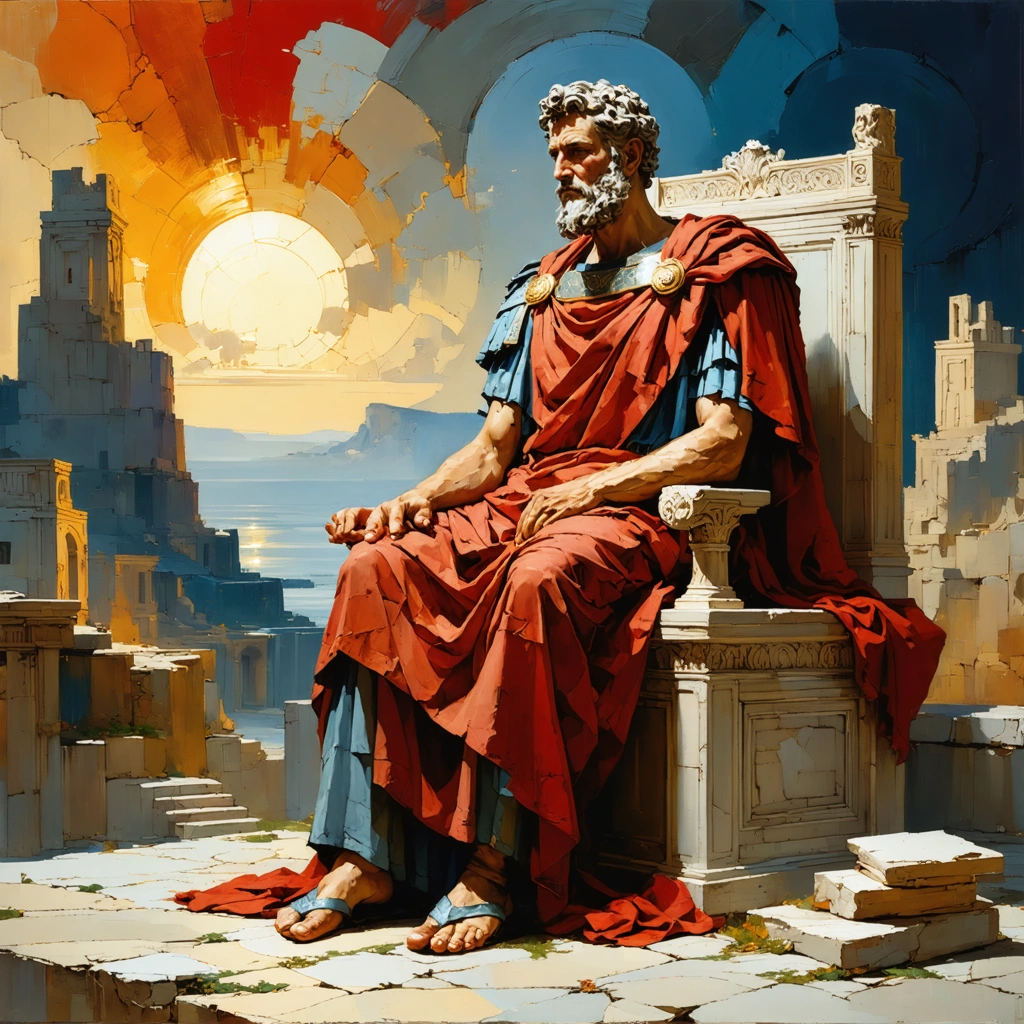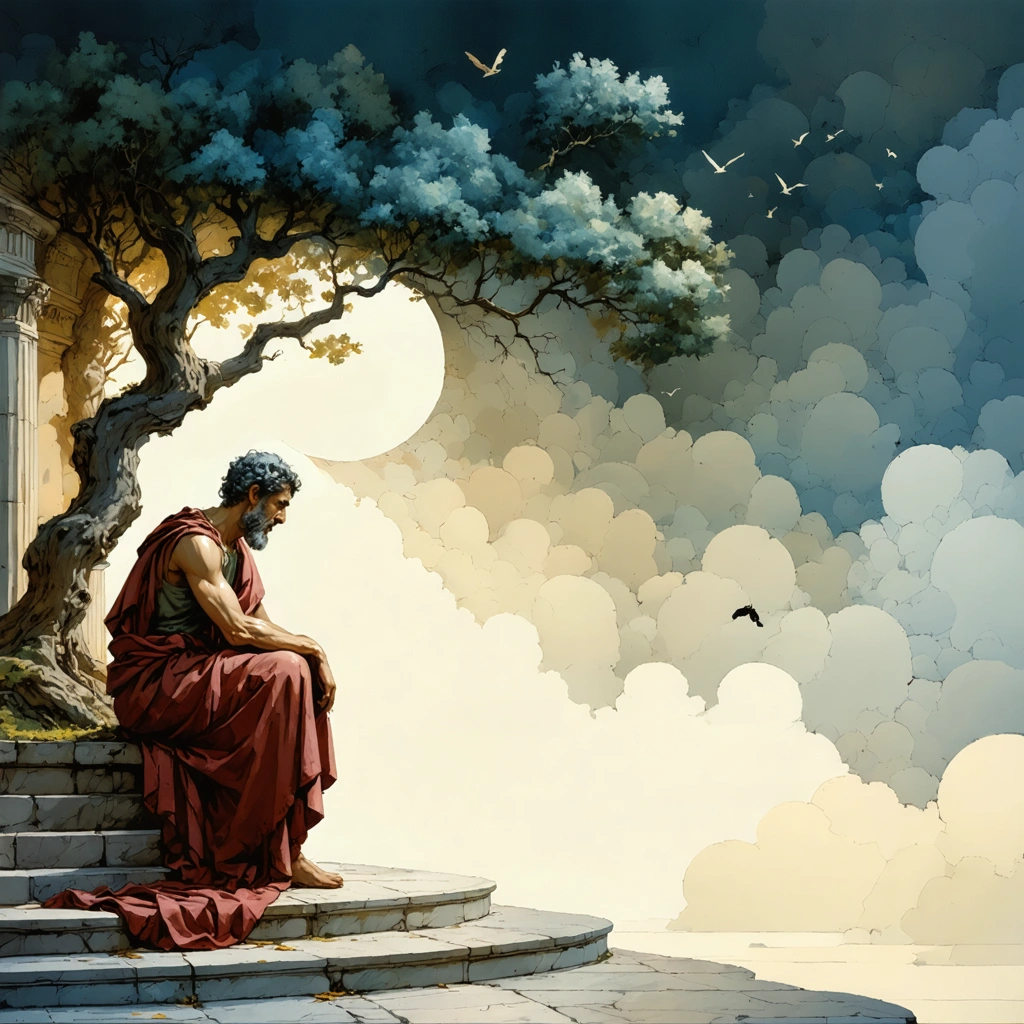When Life Throws Curveballs: Why So Many Feel Unequipped to Cope
Ever find yourself staring at a seemingly endless stream of challenges, wondering how on earth people manage to stay calm, focused, and—dare we say it—resilient? In a world riddled with uncertainty, rapid change, and relentless pressure, it’s easy to feel overwhelmed. Many of us grapple with how to maintain our mental and emotional balance when life doesn’t go according to plan. Whether it's sudden job loss, personal loss, or the constant barrage of news, modern existence often feels like a test of endurance with no clear rulebook.
This struggle is nothing new, though. Ancient thinkers faced their own storms, yet some of their insights have echoed through millennia, offering timeless guidance. One figure stands out prominently: Marco Aurelio, or Marcus Aurelius, the Roman emperor whose private reflections have become a cornerstone of stoikisme—Stoicism in Indonesian—and whose philosophy is increasingly relevant today.
Peeling Back the Layers: What Is Stoicism, and Why Does Marco Aurelio Matter?
If you’ve ever wondered, “Stoicism adalah apa sih?”—what exactly is Stoicism?—you’re in for a fascinating exploration. At its heart, stoicism adalah a practical philosophy founded in ancient Greece and adopted by Roman thinkers, emphasizing virtue, reason, and self-control amidst life’s inevitable hurdles. It doesn’t promise a life free of pain or difficulty. Instead, it teaches us how to navigate hardship with dignity and inner strength.
Marco Aurelio, one of history’s most notable stoics, was no mere philosopher cloistered away from the world; he was a ruler burdened with immense responsibilities. His personal writings, later compiled as Meditations, reveal his struggles and strategies for maintaining resilience when faced with political turmoil, personal loss, and the weight of empire. This blend of real-world application and philosophical depth makes his approach uniquely inspiring.
The Modern Resonance of Ancient Wisdom
So why does a 2,000-year-old philosophy suddenly feel so fresh and vital? Because the core challenges of human existence—uncertainty, pain, disappointment—haven’t changed. What has shifted is our environment: social media stress, 24/7 connectivity, and a culture obsessed with instant gratification. In this context, marco aurelio’s teachings offer a grounding force.
People today are rediscovering stoicism as a toolkit for resilience. From therapists integrating stoic principles into cognitive-behavioral therapy to leaders drawing on its lessons for decision-making under pressure, stoicism is more than an intellectual curiosity. It’s a blueprint for thriving amid chaos.
- Recognizing what’s within your control and what isn’t
- Developing emotional agility and reducing reactive impulses
- Fostering a mindset focused on virtue and purpose over fleeting pleasure
These ideas, rooted in marco aurelio’s writings, are transforming how people approach stress, failure, and even success.
What You’ll Discover in This Article
In the sections ahead, we’ll dive deeper into the essence of stoikisme as practiced by marco aurelio, unpacking key principles that remain strikingly applicable. You’ll learn how his philosophy helps you build resilience—not by avoiding hardship but by embracing it with clarity and composure. We’ll also explore practical ways to weave stoic wisdom into your daily life, whether you’re facing professional challenges, personal setbacks, or simply seeking a steadier mind.
By the end, you might just find that the echoes of Marcus Aurelius resonate louder than ever, lighting a path toward greater calm, confidence, and inner strength in a world that never stops testing us.

Marcus Aurelius: Stoic Wisdom’s Echo and Its Influence on Modern Resilience
Who Was Marco Aurelio and Why Is His Philosophy Still Relevant?
Marco Aurelio, known in English as Marcus Aurelius, was a Roman Emperor from 161 to 180 AD and is widely regarded as one of the most important Stoic philosophers. His work, especially his collection of personal writings titled Meditations, offers profound insights into stoikisme — the ancient Greek philosophy that emphasizes rationality, self-control, and virtue as a path to a fulfilled life.
Despite living nearly two millennia ago, Marco Aurelio’s thoughts resonate deeply with modern audiences, particularly in areas related to mental health and resilience. His philosophy encourages reflection on what is within our control versus what is not, fostering a mindset that helps individuals navigate adversity without being overwhelmed by emotion.
What Is Stoikisme and How Does It Relate to Marcus Aurelius?
Stoikisme, or Stoicism, is a Hellenistic philosophy founded in Athens by Zeno of Citium around 300 BC. It teaches that the path to happiness is found through living in accordance with reason and nature, mastering one’s desires and emotions, and focusing on virtue as the highest good.
Marcus Aurelius is often considered one of the last great Stoic philosophers. His writings exemplify practical stoicism — not just theoretical doctrine but real-world application. He emphasizes:
- Acceptance of fate and external circumstances
- Self-discipline and emotional resilience
- The importance of reason as a guide in decision-making
- Living a life of moral integrity and service
These principles form the backbone of stoikisme and have influenced many modern psychological approaches, including cognitive behavioral therapy (CBT), which also focuses on managing thoughts and emotions rationally.
What Is Stoicism Adalah and How Does It Inspire Modern Resilience Practices?
“Stoicism adalah” is an Indonesian phrase meaning “Stoicism is.” Understanding “stoicism adalah” in the context of modern resilience means recognizing Stoicism as a philosophy that teaches how to endure hardship without losing composure or purpose.
Today, many resilience-building programs incorporate stoic principles because they provide practical tools for coping with stress, uncertainty, and failure. For example:
- Focus on Control: Stoicism teaches distinguishing between what we can control (our thoughts, actions) and what we cannot (others’ opinions, external events). Modern resilience practices encourage this mindset to reduce anxiety and increase effective problem-solving.
- Negative Visualization: Marcus Aurelius advocated imagining worst-case scenarios to prepare emotionally and lessen fear. This technique is used in resilience training to build mental toughness.
- Mindfulness and Reflection: Regular self-examination was key to Marcus Aurelius’ philosophy. Today, mindfulness practices and journaling help individuals build resilience by fostering awareness and emotional regulation.
These practices demonstrate the enduring value of stoicism adalah a framework not just for survival but for thriving under pressure.
How Have Modern Figures and Movements Applied Marcus Aurelius’ Stoic Wisdom?
Marcus Aurelius’ stoikisme has inspired a wide range of fields and individuals, including:
- Psychology: Cognitive Behavioral Therapy (CBT) draws heavily on Stoic ideas about managing destructive thoughts and emotions.
- Leadership Training: CEOs and military leaders study Marcus Aurelius to cultivate calm decisiveness and ethical leadership.
- Self-Help and Personal Development: Books like Ryan Holiday’s The Daily Stoic have popularized Stoic exercises for modern audiences seeking resilience and clarity.
- Sports Psychology: Athletes use stoic principles to maintain focus and composure during high-pressure competition.
These real-life applications show that Marco Aurelio’s philosophy is not just an ancient relic but a dynamic, practical guide for contemporary challenges.
What Are Practical Steps to Incorporate Stoic Wisdom into Daily Life?
To apply Marco Aurelio’s stoikisme and build resilience, consider these actionable steps:
- Daily Reflection: Set aside time each day to journal about your actions, emotions, and reactions. Ask yourself whether you acted according to reason and virtue.
- Practice Negative Visualization: Occasionally imagine losing what you value to appreciate it more and prepare mentally for setbacks.
- Focus on What You Can Control: When faced with challenges, consciously separate your efforts from external outcomes.
- Embrace Discomfort: Build emotional strength by deliberately facing small hardships, such as cold showers or fasting.
- Adopt a Virtuous Mindset: Prioritize honesty, courage, patience, and kindness in daily decisions.
By integrating these stoic practices, anyone can cultivate a resilient mindset inspired by the timeless wisdom of Marco Aurelio.
Conclusion: Why Marco Aurelio’s Stoic Philosophy Matters Today
In an age marked by rapid change, uncertainty, and stress, the teachings of Marcus Aurelius and the philosophy of stoikisme offer a beacon of stability and purpose. Understanding stoicism adalah embracing a mindset that empowers us to endure hardship gracefully, focus on our inner values, and lead with integrity.
Marco Aurelio’s legacy is not only a historical curiosity but a living philosophy that continues to inspire resilience practices worldwide, proving that ancient wisdom can profoundly shape modern well-being and leadership.




